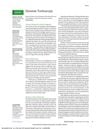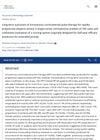 14 citations,
January 2017 in “Skin appendage disorders”
14 citations,
January 2017 in “Skin appendage disorders” Simvastatin/ezetimibe did not effectively treat severe alopecia areata and caused side effects in some patients.
 16 citations,
October 2014 in “Journal of the American Academy of Dermatology”
16 citations,
October 2014 in “Journal of the American Academy of Dermatology” Oral retinoids may help some patients with hard-to-treat lichen planopilaris, but more research is needed.
 24 citations,
January 2020 in “JAAD Case Reports”
24 citations,
January 2020 in “JAAD Case Reports” Topical metformin helped regrow hair in two women with a hard-to-treat scarring hair loss condition.
January 2022 in “Clinical Cases in Dermatology” Early treatment of traction alopecia can reverse hair loss; prevention involves avoiding tight hairstyles.
 May 2009 in “Medical and surgical dermatology/Medical & surgical dermatology”
May 2009 in “Medical and surgical dermatology/Medical & surgical dermatology” Hair and nail conditions can stabilize or improve over time, and new treatments show promise.
 61 citations,
January 2019 in “American Journal of Clinical Dermatology”
61 citations,
January 2019 in “American Journal of Clinical Dermatology” The cause of Frontal Fibrosing Alopecia is unclear, diagnosis involves clinical evaluation and various treatments exist, but their effectiveness is uncertain.
 14 citations,
June 2018 in “JAMA Dermatology”
14 citations,
June 2018 in “JAMA Dermatology” Trichoscopy is useful for diagnosing and monitoring hair and scalp conditions over time.
1 citations,
March 2022 in “Anais brasileiros de dermatologia/Anais Brasileiros de Dermatologia” Trichoscopy helps tell apart hair loss due to alopecia areata from trichotillomania in eyebrows.
76 citations,
January 2011 in “Indian Journal of Dermatology/Indian journal of dermatology” Dermoscopy is a useful tool for diagnosing and managing alopecia areata.
 2 citations,
February 2023 in “Journal of The American Academy of Dermatology”
2 citations,
February 2023 in “Journal of The American Academy of Dermatology” Scalp biopsies greatly improved diagnosis and treatment for Black women with unclear alopecia.
March 2022 in “JAAD case reports” Accurate diagnosis is crucial for effective treatment of hair loss.
 January 2019 in “Georg Thieme Verlag eBooks”
January 2019 in “Georg Thieme Verlag eBooks” Platelet-Rich Plasma (PRP) therapy can effectively treat various hair loss conditions, improve hair count, thickness, and density, and potentially speed up results when combined with surgical techniques.
 53 citations,
January 2018 in “JAAD case reports”
53 citations,
January 2018 in “JAAD case reports” Dupilumab for eczema may cause hair loss.
 October 2024 in “The Journal of Dermatology”
October 2024 in “The Journal of Dermatology” Intravenous corticosteroid therapy is effective for long-term hair regrowth in alopecia areata, and a scoring system helps predict treatment success and relapse.
3 citations,
April 2023 in “Dermatologica Sinica” PRP treatment may help with alopecia areata, especially in newer cases.
17 citations,
December 2013 in “Journal of Investigative Dermatology Symposium Proceedings” Autoimmune and metabolic issues are linked, and treating one may worsen another.
 33 citations,
December 2005 in “Archives of dermatology”
33 citations,
December 2005 in “Archives of dermatology” Alefacept showed some effectiveness for alopecia areata but needs more research.
75 citations,
June 2005 in “Archives of Dermatology” Etanercept may not prevent alopecia areata from coming back.
 3 citations,
March 2023 in “JAAD case reports”
3 citations,
March 2023 in “JAAD case reports” Upadacitinib cleared scalp alopecia areata in three patients and also improved atopic dermatitis with minimal side effects.
 August 2023 in “JAAD international”
August 2023 in “JAAD international” Most patients with Central Centrifugal Cicatricial Alopecia at the reviewed institution were middle-aged Black women, often with no symptoms, and commonly treated with topical medications.
 17 citations,
October 2017 in “Journal of Cutaneous Medicine and Surgery”
17 citations,
October 2017 in “Journal of Cutaneous Medicine and Surgery” No treatment has been proven to effectively stop hair loss or regrow hair in Frontal Fibrosing Alopecia, and more research is needed.
 6 citations,
March 2019 in “JAAD case reports”
6 citations,
March 2019 in “JAAD case reports” A new mix of anthralin and calcipotriene might help treat severe hair loss.
 7 citations,
September 2008 in “Dermatologic surgery”
7 citations,
September 2008 in “Dermatologic surgery” Hair transplantation can successfully treat stubborn alopecia areata.
 February 2022 in “International Journal of Research in Dermatology”
February 2022 in “International Journal of Research in Dermatology” Tretinoin alone is more effective than combined with microdermabrasion for long-term alopecia areata treatment.
 15 citations,
October 2020 in “Journal of Investigative Dermatology Symposium Proceedings”
15 citations,
October 2020 in “Journal of Investigative Dermatology Symposium Proceedings” Platelet-Rich Plasma (PRP) could potentially help regrow hair in people with Alopecia Areata, but more research is needed to confirm its effectiveness.
3 citations,
August 2018 in “Therapeutics and Clinical Risk Management” Corticosteroid therapy for alopecia areata can cause severe hip bone damage.
 71 citations,
March 2009 in “Seminars in cutaneous medicine and surgery”
71 citations,
March 2009 in “Seminars in cutaneous medicine and surgery” Alopecia areata can cause unpredictable hair loss, and treatments like corticosteroids and minoxidil may help but have varying side effects.
 July 2022 in “SKIN The Journal of Cutaneous Medicine”
July 2022 in “SKIN The Journal of Cutaneous Medicine” A new lotion with halobetasol and tazarotene successfully treats acne keloidalis nuchae.
 January 2023 in “Indian Dermatology Online Journal”
January 2023 in “Indian Dermatology Online Journal” Bimatoprost and clobetasol are both effective for scalp hair loss, but bimatoprost works faster, has fewer side effects, and grows more colored hair.
 January 2024 in “Archives of dermatological research”
January 2024 in “Archives of dermatological research” Both treatments for alopecia areata showed similar modest effectiveness.






















